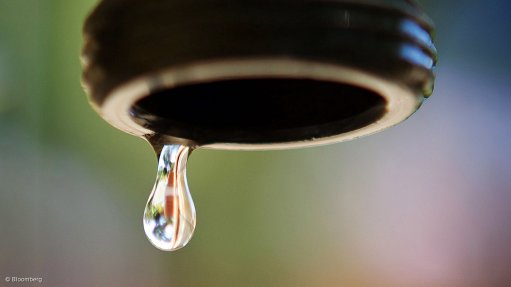
Photo by: Bloomberg
The Covid-19 pandemic has magnified the deficits in the water and sanitation sectors in South Africa, Water Research Commission (WRC) CEO Dr Dhesigan Naidoo said during a webinar on May 22.
He added that the pandemic had also highlighted some of the opportunities in these sectors.
Naidoo said that while access to water and sanitation had improved in recent years, there was still a challenge to cover “the last mile” in providing universal access to citizens.
The issue of informal settlements, slums and dynamic migration have exacerbated the challenge in being able to provide these services, meaning that “the last mile” is a “complicated one”, he added.
According to the Department of Water and Sanitation’s Leonardo Manus, about 12% of the South African population do not have access to water, while 21.3% do not have access to basic sanitation services.
Additionally, the decrease in water quality globally, as well as conventional and emerging pollutants brought forth “a whole new mix” of challenges, Naidoo pointed out.
He explained that improving access to water and sanitation brought a country closer to achieving the United Nations Sustainable Development Goals targets, which meant that the lack of access to these services and systems needed to be addressed in such a way that it “becomes building blocks for where [South Africa is] going to venture into the future”.
Increasing local water security in a significant way will lead the country into the Fourth Industrial Revolution (4IR), which “could be the key dividend” coming out of Covid-19, he said.
“Because we are needing to do so many things virtually, as a matter of necessity, it will help us in infiltrating and expanding our opportunity to start plugging in the benefits of 4IR into the way we manage water and sanitation systems,” he explained.
The 4IR could assist from the most complex levels of the centralised management of water in the macro system, to the most localised level, where individuals start to manage their own demand, using the tools of 4IR.
Poor sanitation, meanwhile, increases the risk of infection, in turn magnifying the sanitation crisis amid the current Covid-19 crisis.
While a lot of work still needs to be done in Africa, as a whole, Naidoo believes the pandemic may well be the opportunity that the continent needs as it provides an opportunity not to follow the conventional development mechanisms that the rest of the world had to experience.
Rather, Africa has the opportunity to switch directly to non-sewered sanitation, according to Naidoo, who enthused that the technology revolution in the sanitation sector is largely waterless, or uses minimal water, meaning that non-sewered sanitation “could be the equivalent in the sanitation domain of what we saw in the communication revolution where Africa did not go through the intermediate step of underlying connection, but went directly to mobile connection”.
The environment has enabled this to happen, Naidoo said, encouraging the use of the “Covid moment” to catalyse and reinvent various programmes, such as the Sanitation Transformation Initiative.
“If we do not up our game on the provision of clean water… and safe sanitation, those numbers associated with Covid-19 will get higher and higher in a way that becomes more and more difficult to deal with,” he lamented.
The Covid-19 pandemic, Naidoo added, gives South Africa “a concentration point” to rethink its trajectory, to organise investments in the future water and sanitation sector, and lead the way to a possible “much better place” post-Covid-19, than what the country was in before the pandemic.